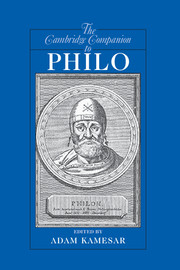6 - Philo’s Ethics
from Part 2 - Philo’s Thought
Published online by Cambridge University Press: 28 November 2009
Summary
To speak of the ethics of Philo of Alexandria is obviously not to presuppose that his works should be structured according to the tripartite division of philosophy (logic, physics, ethics) inherited from the Hellenistic period. Philo is well aware of this division but his way of thinking is far too fluid, far too dominated by the requirements of his biblical exegesis to bear such a rigid framework. On the other hand, his interest in ethics is certainly fundamental in his works, although it finds expression in a complex manner. For he relies on the Bible as his first source of inspiration, as the interpretation of the 'special laws' shows, but also refers to a great variety of philosophical themes, the unity of which we shall need to examine. We shall treat the following points in succession: (I) the philosophical principles of ethics, (II) the virtues, (III) the passions, (IV) moral progress, and (V) politics. / I. The Philosophical Principles: OIKEIŌSIS and HOMOIŌSIS / Philo was a complex thinker who lived in the age of Middle Platonism, which itself is considered as a turbulent transition period between the Hellenistic and Neoplatonist systems. However, in the way that Philo thinks about morality, although it is a line of thought often difficult to pin down, one point comes out very clearly: he rejects the grounding of ethics on the dogma of oikeiōsis, or 'appropriation'. It is a rejection that is all the more remarkable because the dogma of oikeiōsis is a fundamental idea of Stoicism, from which he borrowed so much.
- Type
- Chapter
- Information
- The Cambridge Companion to Philo , pp. 146 - 172Publisher: Cambridge University PressPrint publication year: 2009
- 8
- Cited by

